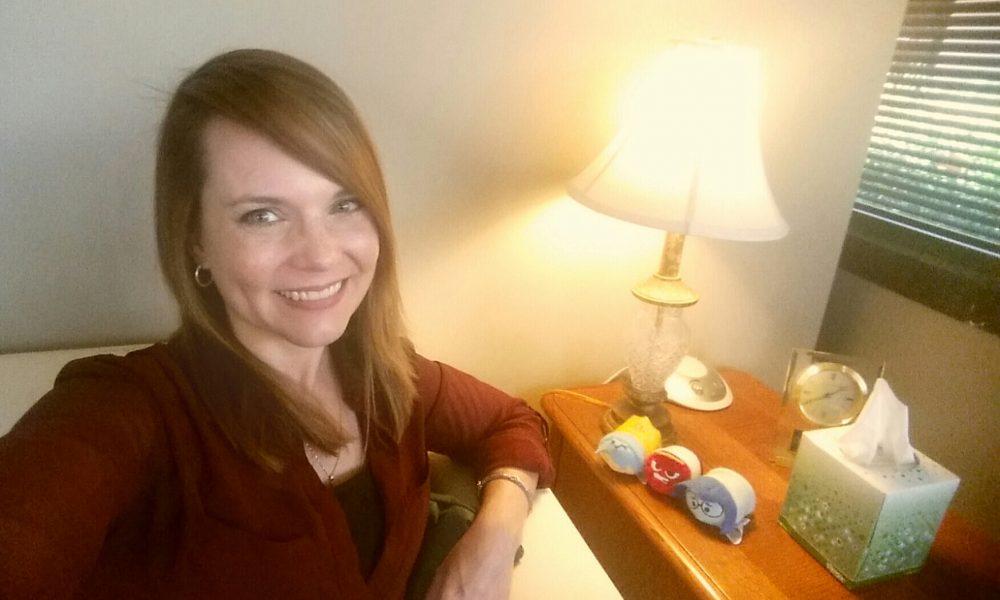

Today we’d like to introduce you to Dr. Kelley Martin Williams.
Dr. Williams, please share your story with us. How did you get to where you are today?
The old cliché is that psychologists find themselves in the field because they are trying to sort out their own “problems.” While that may be true for some (don’t most of us end up working in an industry that interests us?), I did not end up here because of my own struggles but because of the struggles of those around me. For the sake of being true to myself and in an effort to destigmatize mental health concerns, I will be a bit transparent here…When you are repeatedly surrounded as a young child by abuse, grief, depression, anxiety, suicide, and disabilities, you tend to wonder what all of this is about. You ask yourself why do these things happen and how are some able to rise above such pain whereas others are not. That is how I ended up here. I wanted to know how people overcame such heartache and pain and help others develop some semblance of inner strength. Along the way, I developed a passion for working with children and families impacted by developmental disabilities such as Autism and Down’s Syndrome.
Fast forward a few years, and my life took a turn. Little did I know that the field was going to prepare me for the life God had chosen for me, a life where mental illness left no stone unturned. My own life, now a life that is intimately intertwined with Bipolar Disorder II, Asperger’s Disorder, ADHD, anxiety, depression, Parkinson’s, and a blended family life…I truly understand what my special needs families need. The books do not train you to look much past the afflicted individual, and the research is just beginning to scratch the surface here. Insurance companies only reimburse for treatment when it is attached to something that is “diagnosable,” and many plans are cutting family therapy out as a covered service all together. But, as one who has not only read the articles, does the work, and regularly fights with insurance companies but also lives the impact of mental illness day in and day out, I truly see what my clients see because I am now one of them. I live what they live. I see that the work cannot just be focused on the individual with a mental health condition or special need but that the entire family system often needs support. A spouse of someone with Bipolar may also need counseling when struggling with her husband’s depressive and manic episodes. A father may need help connecting with his autistic son. An entire family may need a safe place to process their hidden secrets about their loved one’s battle with addiction. A grandfather may need support while he watches Parkinson’s steal away his wife. These are not necessarily diagnosable conditions, but it clearly does not make them any less important. When the entire family is properly supported, it can only have a positive impact on the afflicted individual and vice versa. And, when mental health concerns are addressed early, the prognosis can be significantly better. This has become my mission, and, as Clinical Director of Carole and Ronald Krist Samaritan Counseling Center, this is where I plan to focus our work moving forward. We will continue to support our community through three new initiatives: Faith – supporting clergy and their congregations, Hope – providing treatment to the under-served and forgotten, and Love – providing preventative and wrap-around care for individuals and families touched by mental illness.
Great, so let’s dig a little deeper into the story – has it been an easy path overall and if not, what were the challenges you’ve had to overcome?
Is a life worth living ever smooth? Being a first generation college student who decided to move across the country for graduate school was not initially a well received adventure. Moving back to Texas and establishing a practice in a state where mental health is sorely underfunded and misunderstood did not make for easy beginnings as a newly licensed clinician. Did you know that Texas ranks first in the nation for uninsured individuals and last in spending on mental health care? Three in four Texans have a friend or family member who has a mental health condition. You do the math. It doesn’t add up, does it? Living with someone who has a severe mental illness and seeing first hand how our emergency rooms and hospitals are not equipped for this and how much family is often not a part of the treatment process or how they often find their hands tied…It has been a heartbreaking experience, one that has fueled my passion and commitment to my clients as well as the Center’s reach and impact within our community.
Carole & Ronald Krist Samaritan Counseling Center – what should we know? What do you guys do best? What sets you apart from the competition?
The Carole & Ronald Krist Samaritan Counseling Center is one of the largest nonprofit mental health outpatient agencies in the Greater Houston-Galveston area. A couple of things make us unique.
One, we are a faith based agency. Typically, mental health care providers are trained to keep faith and spirituality out of the therapy office. We see this differently. We believe that an individual’s faith belief system is just as important as one’s family history, life situation, and even physiological makeup. It is an important part of who you are, and we treat it as such. Our clinicians are specially trained to integrate one’s belief system, whatever system that is, into your care if that is something you choose. We do not push religious beliefs onto our clients; we respect their values. We help individuals from all walks of life, no matter their beliefs, and we integrate their beliefs into their care. Our mission is to treat the whole person – mind, body, and spirit.
Second, we are a “one-stop shop.” We offer counseling for all ages and mental health conditions where outpatient treatment is appropriate. We also offer psychiatry, psychological testing, clergy care and support, group therapy, speech therapy, massage therapy, family and divorce mediation, Irlen services, academic tutoring, and community education. Our offices are private and confidential and offer a warm, cozy environment.
Lastly, and what we are most proud of, is our quality of care. We are accredited by The Samaritan Institute and are a part of an international network of independent, accredited counseling centers in more than 400 cities in 35 states and Japan. The Samaritan Network is the largest provider of primary mental health care in the nation. Last year, approximately 3,000 individuals received nearly 16,000 hours of treatment at the Center. Approximately 80% of the people seen at the Center receive services at a reduced fee or no fee. Our most recent client satisfaction survey found that 93% of surveyed clients felt that they had achieved at least one counseling goal, 92% reported improved relationships, and 98% reported that they would recommend us to family and friends. You cannot get much better than this!
What moment in your career do you look back most fondly on?
My proudest moments are consistently tied to my client’s outcomes and the morale of our staff. I have received a handful of emails from parents a year or two after a client has been discharged to let me know of their personal successes – their teachers are seeing continued improvement in their academics, behavior, or social skills, they’ve earned character awards from school, they’re now thriving in their school’s Gifted and Talented program…To have their progress sustained a couple of years out without support lets me know that the work we did together has positively impacted their lives. To be able to witness first hand a child’s anxiety go from daily meltdowns at school drop-off to successfully walking in on his own…an autistic high schooler go from wanting to drop out or, worse, commit suicide, because of the pressure she was under to successfully graduating with her high school diploma…witnessing struggling parents growing in confidence in their parenting skills… seeing a nonverbal child I evaluated return 3 years later for a follow-up now communicating and no longer head-banging because their questions were answered and the proper referrals were made…This is what fills me. These are my proudest moments as a clinician. The impact I am able to have on children, teens, and families…This is what keeps me going.
As a supervisor and director, my proudest moments are our staff’s successes. When a student has his first ever intake, an intern changes her career focus from academia to clinical work because of our supervision together, and our staff are able to share client success stories and come to work every day happy and fulfilled…I really cannot ask for more. Our staff’s successes are my successes, too.
How do you think the industry will change over the next decade?
Historically, mental health concerns have been misunderstood, considered taboo, and stigmatized. Organizations such as National Alliance on Mental Illness (NAMI) and individuals such as the late Carrie Fisher and Prince Harry have done an amazing job of working to destigmatize mental illness and the necessity of treatment. While the conversation has finally started, there is still much work to be done in order to increase awareness and let people know that it is okay to seek help. We want people to understand that our brains are an organ just like our hearts, lungs, and kidneys, and it is just as susceptible to malfunction, if you will, as any other organ in the body. One would never suggest that someone with a heart condition is “weak” or “needs to pick himself up by his bootstraps and just get over it.” Why is our brain any different? The truth is, it isn’t. We hope that with more people coming to understand the complexities and societal impact of mental illness, more people will receive the care they need so that they can return to living.
With increased awareness comes the need for increased recognition and support of our state and federal government. True insurance parity and funding are large barriers to mental health care. With Medicaid expansion on the chopping block and healthcare reform in a philosophical debate about right vs. privilege, no one really knows right now what will happen to coverage. Unfortunately, should mental health coverage be cut, many more people will not receive proper treatment and our emergency rooms will fill up with illnesses that the ER doctors are not equipped to treat. Untreated mental illness can result in dropping out of school, decreased work productivity, unemployment, crime, homelessness, and suicide. It can lead to broken homes, hearts, families, and communities. Recognizing the impact treatment can have on mental illness from our government and community leaders is crucial. So, it is difficult to say where the industry will be in a few years because funding will have a direct impact on our direction. Despite this unsteady foundation, however, the mental health industry continues to march forward. It is developing some new and exciting ways to reach those who do not have easy access to care through avenues such as telepsychiatry, and researchers are finding that combining mental health treatment with other forms of care, such as primary medical care, improves treatment outcomes. The Center is at the forefront of this innovation with some of our community partners, and we plan to do more.
Pricing:
Our mission is to serve the mind, body, and spirit regardless of one’s ability to pay. With the help of supporters, we are able to provide our services on a sliding scale for those who are underinsured. Our staff are able to accept most major insurance plans, including Tricare, Medicaid, and Medicare. Thanks to the support of major donors, we are also able to provide our services to qualifying uninsured children, adults, and families in our community at no cost.
We cannot fulfill our mission without the financial support of our community. We rely heavily on donations from foundations, organizations, corporations, and individuals. Without their support, many of our clients would go without proper care. We are grateful for our supporters (and could always use a few more)!
Contact Info:
- Address: 16441 Space Center Blvd.,
Suite C-100
Houston, TX 77058 - Website: www.samaritanhouston.org
- Phone: 281-480-7554
- Email: info@samaritanhouston.org
- Facebook: @Krist.Samaritan.Center
- Twitter: @Krist_Samaritan








Getting in touch: VoyageHouston is built on recommendations from the community; it’s how we uncover hidden gems, so if you know someone who deserves recognition please let us know here.

















